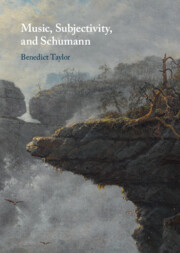Book contents
- Music, Subjectivity, and Schumann
- Music, Subjectivity, and Schumann
- Copyright page
- Contents
- Examples
- Acknowledgements
- Abbreviations
- Preamble
- Prosopopoeic Preliminaries
- Part I Hearing Subjects
- 2 Hearing the Self
- 3 Hearing Selves
- Part II Hearing Presence
- Part III Hearing Absence
- Part IV Hearing Others
- Epilogue
- Bibliography
- Index
2 - Hearing the Self
from Part I - Hearing Subjects
Published online by Cambridge University Press: 07 April 2022
- Music, Subjectivity, and Schumann
- Music, Subjectivity, and Schumann
- Copyright page
- Contents
- Examples
- Acknowledgements
- Abbreviations
- Preamble
- Prosopopoeic Preliminaries
- Part I Hearing Subjects
- 2 Hearing the Self
- 3 Hearing Selves
- Part II Hearing Presence
- Part III Hearing Absence
- Part IV Hearing Others
- Epilogue
- Bibliography
- Index
Summary
Part I, ‘Hearing Subjects’, turns attention to Robert Schumann, addressing the composer’s early grappling with the Romantic problematisation of subjectivity and personal identity frequently present in his music of the 1830s and early 1840s. In ‘Hearing the Self’, I trace the historical development of subjectivity in music up to Schumann’s time, before turning to an early and notable exemplification of the composer’s practice in Carnaval. This forms the starting point for a more detailed consideration of the ways in which a sense of subjectivity can be manifested in Schumann’s piano music of the 1830s, including such features as allusiveness, idiosyncrasy, interiority, a fantasy principle in connexion of moods, and the questioning of continuity and coherence. Finally, I look at the sense of subjectivity conveyed in Schumann’s concertos and the sense in which they collapse distinctions between self and world.
- Type
- Chapter
- Information
- Music, Subjectivity, and Schumann , pp. 57 - 85Publisher: Cambridge University PressPrint publication year: 2022

